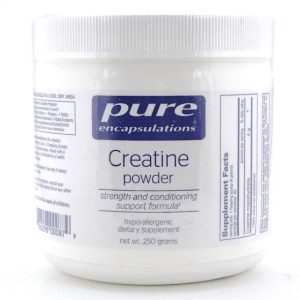
Creatine is important for cognitive and neuronal health and affects the expression of over 250 genes in the body. Creatine is a naturally-occurring organic acid (protein building block) that’s found in meat, eggs and fish. It is made by the human body in the liver, kidneys, and pancreas. It combines with phosphate inside of the mitochondria.
Creatine is a molecule in our energy system (creatine phosphate) that rapidly produces energy (ATP) to support cellular function. Thus it has performance-enhancing and neuroprotective properties. A safe and well-researched supplement, creatine has been shown to help in ageing and brain injury. It is a molecule produced in the body, where it stores high-energy phosphate groups in the form of phosphocreatine. During periods of stress, phosphocreatine releases energy aiding cellular function. This is what helps the brain, bones, muscles, and liver.
Creatine supplementation confers a variety of health benefits, notably neuro-protective and cardio protective. It is often used by athletes to increase both power output and lean mass. The neuro-protective effect is secondary to its ability to donate phosphate groups. Creatine has many effects on the central nervous system and it is known to increase focus. It is also interesting that neurons possess the ability to manufacture creatine. There are many studies showing that creatine increases cognition, this is especially true in strict vegetarians. There are even studies showing that creatine may exert anticancer effects.
In rats and mice given creatine injections (3g/kg) for up to five days prior to traumatic brain injury, supplementation was able to reduce brain injury by 3-36% (time dependent, with five days being more protective than one or three), and dietary intake of creatine at 1% over four weeks halved subsequent injuries.
In children and adults with traumatic brain injury (TBI), six months of creatine supplementation of 400mg/kg bodyweight appears to significantly reduce the frequency of headaches (from 93.8% to 11.1%), fatigue (from 82.4% to 11.1%), and dizziness (from 88.9% to 43.8%), relative to an unblinded control.
Preliminary evidence also suggests that headaches and dizziness associated with brain injury can be attenuated with oral supplementation of creatine. Interestingly, studies suggest that creatine supplements may help lower levels of triglycerides (fats in the blood) in men and women with high concentrations of triglycerides. Creatine has also been reported to help lower levels of homocysteine. Homocysteine is associated with heart disease, including heart attack and stroke. This is a good thing during the time of a brain injury when blood coagulation systems can be out of whack.
 Not everyone responds equally to creatine supplementation and it is thought that genetic differences in the metabolism are responsible. Creatine must undergo methylation, and many genes affect one’s ability to methylate molecules. Furthermore, men, black race, and Hispanics have a higher capacity to synthesize creatine in their cells than others. This all brings up the point that people should consider DNA testing such as 23 and me and/or DNA fit to assess their ability to metabolize creatine.
Not everyone responds equally to creatine supplementation and it is thought that genetic differences in the metabolism are responsible. Creatine must undergo methylation, and many genes affect one’s ability to methylate molecules. Furthermore, men, black race, and Hispanics have a higher capacity to synthesize creatine in their cells than others. This all brings up the point that people should consider DNA testing such as 23 and me and/or DNA fit to assess their ability to metabolize creatine.
Studies on the safety aspects of creatine in diabetics have shown no adverse results. Stomach cramping can occur when creatine is supplemented without sufficient water. Diarrhea and nausea can occur when too much creatine is supplemented at once, in which case doses should be spread out over the day and taken with meals. Most studies show that 5 grams per day is adequate.